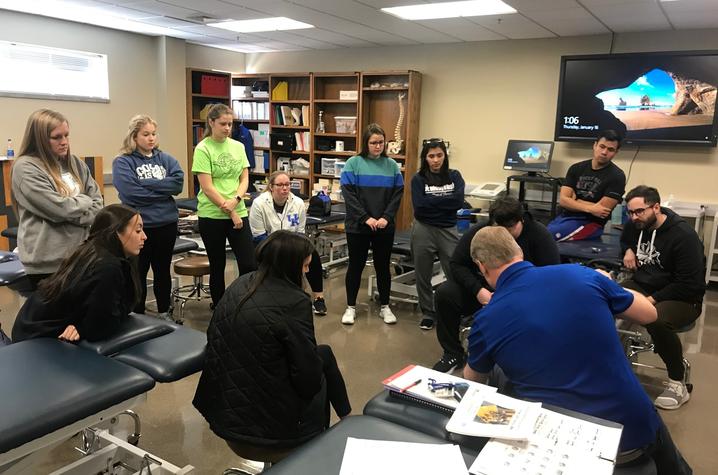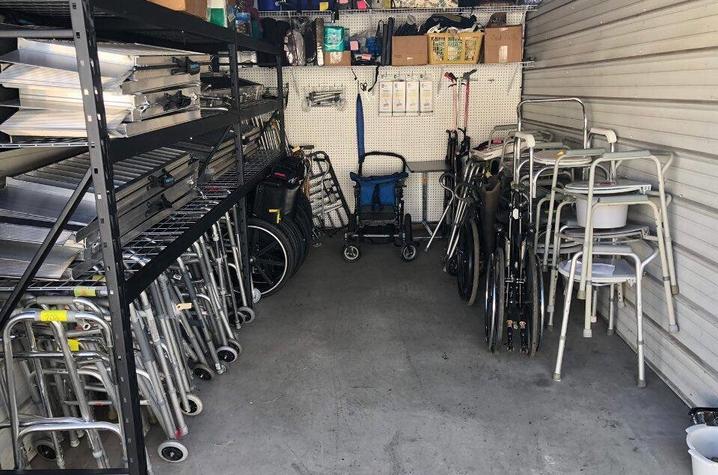UK Faculty, Students Refurbish and Provide Medical Equipment in Rural Kentucky
LEXINGTON, Ky. (July 2, 2020) — Roughly one in seven Americans live with a disability that impacts daily mobility. The average cost of a wheelchair ranges from $500 to $2,000 without insurance, seriously curbing access to this essential equipment for patients who lack proper coverage. The University of Kentucky’s Center of Excellence in Rural Health (CERH) in Hazard is working to bridge this gap for Kentucky patients through a project that repairs and redistributes used medical equipment to communities in need.
Project CARAT—short for Coordinating and Assisting the Reuse of Assistive Technology— began in 2013 as a collaborative Health Resources and Services Administration grant with CERH, the UK Physical Therapy program, and the Kentucky Office of Vocational Rehabilitation where two CARAT sites opened—one in Hazard and the other in Thelma, Kentucky. Within the last seven years three additional sites in Lexington, Louisville and Paducah have been added.
In order to expand the reach of the Hazard facility, CERH, the UK College of Health Sciences and the UK College of Social Work partnered in applying for a 2020 UK Sustainability Challenge Grant and the project was funded. This funding will allow the programs to work collaboratively to provide a larger number of refurbished equipment items to individuals in need and increase opportunities for community members to engage with the project at various levels.
Keisha Hudson, CERH’s administrative research assistant, said each CARAT site is unique in terms of need for equipment and community support will impact the project’s continued success.
“We hope to increase engagement with the public,” she said. “Community-donated equipment is crucial to our success and we hope more awareness of our mission will result in equipment donations and greater access to care.”
Used canes, walkers and wheelchairs can easily be repurposed for additional use. Unfortunately, most of this medically necessary equipment is thrown out after acquiring wear and tear. The team behind Project CARAT works to repair, sanitize and rehome used equipment in local communities.
“If you drive up and down your streets, it’s amazing the number of wheelchairs and walkers you will find waiting for the garbage truck. There’s also tons of equipment in landfills,” said Pat Kitzman, Ph.D., professor of physical therapy and a founder of Project CARAT. “We have a supply, and we have a need; but we did not have the go-between until now.”
Kitzman said the project was also borne from challenges he faced as a home health physical therapist. His firsthand experience has impacted both the project’s overarching mission and how he teaches his physical therapy students.
“I was always having to MacGyver somebody’s wheelchair because current insurance policies only allow patients to receive a new wheelchair every five years. They will not replace the chair sooner if something happens to it,” he said. “I knew our students, who will one day become future health care providers, would need this knowledge to help their patients.”
Fran Feltner, director of the UK Center of Excellence in Rural Health, added she hopes Project CARAT will provide sustainable solutions and continuous expansion for much needed care in rural Kentucky.
“Serving people is at the heart of everything we do,” she said. “Project CARAT is giving patients the equipment they need, providing greater health care resources, and looking at the real needs of each individual community. This type of precision care is a building block to addressing health disparities in our communities and in our state.”
“This project was a natural fit for our social work students,” said Melissa Slone, UK College of Social Work East program coordinator at CERH. “Accessing resources, providing services and breaking down barriers is what social workers do.”
“What we do is not for the glory of the grant,” Feltner said. “It’s to provide services for people who truly need them.”
Donations to Project CARAT can also be made locally. The Lexington site is run by UK’s Human Development Institute (HDI), as part of HDI’s Center for Assistive Technology Services (CATS). The group is currently taking donations by appointment at their location at 2358 Nicholasville Road, Suite 180; call 859-218-7979 to schedule an appointment. For more information, visit https://hdi.uky.edu/HDICATS.
As the state’s flagship, land-grant institution, the University of Kentucky exists to advance the Commonwealth. We do that by preparing the next generation of leaders — placing students at the heart of everything we do — and transforming the lives of Kentuckians through education, research and creative work, service and health care. We pride ourselves on being a catalyst for breakthroughs and a force for healing, a place where ingenuity unfolds. It's all made possible by our people — visionaries, disruptors and pioneers — who make up 200 academic programs, a $476.5 million research and development enterprise and a world-class medical center, all on one campus.







